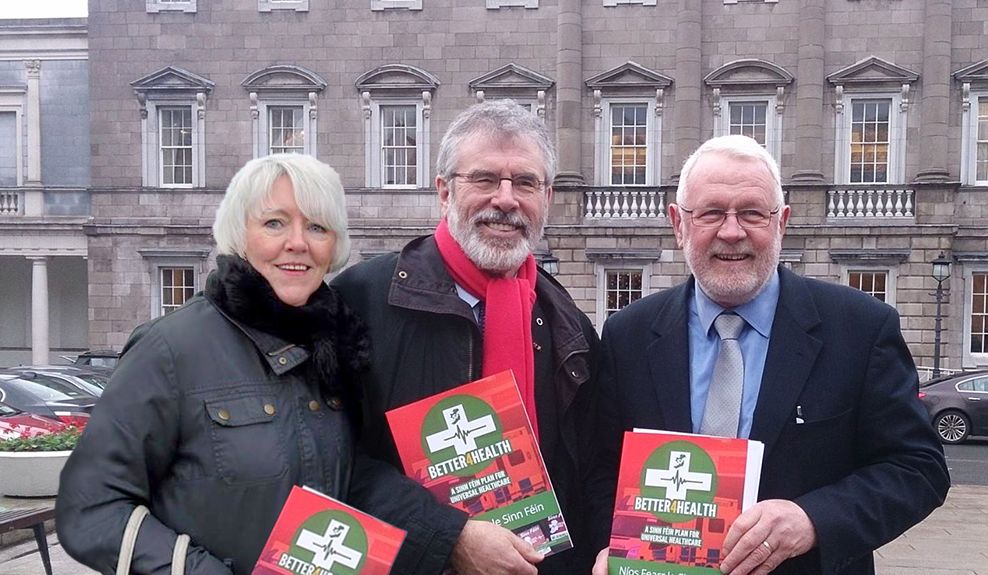ON November 18 in Killarney 820 republicans broke bread together in honour of Martin and Marie Ferris. It was a great night. Marie Ferris is one of my heroes. A warrior woman. An activist. A mammy. A mamó. And the wife of Martin Ferris.
Martin is one of my heroes as well. He is as tough as old boots. As strong as teak. A Kerry Gael from head to toe. But he has the heart of an angel. That’s probably why Marie has put up with him all this time. They were married in 1978. Marie had returned from Australia. Her story is an amazing one. I am particularly taken by her mother Rita. Better known as ‘Gargy’, from Mayo, she was orphaned before she was five and ended up with the Sisters of Mercy in Westport.
She was released aged sixteeen. She became pregnant and a single mother when she was twenty one. Her son Seán was seized from her when she asked for help from his father with rearing the child. Her son, like Gargy his mother, was given over to the nuns. Broken-hearted, Gargy went to England and then Australia where she married Jimmy, a Kerry man who she had met in England. They went on to have four children including Marie.
Forty years later their oldest brother Sean and Gargy were reunited and his siblings met him for the first time. I remember Marie at that time being delighted at the prospect of her family being together for the first time. Theirs is a story of Ireland at that time. A story of separation, cruel deprivation, exile and totally unacceptable ill-treatment of citizens by a right-wing uncaring establishment. But its victims always hoped for better days. Marie’s parents never gave up on Ireland. They knew a better life was possible. Even though they were then in Australia, Marie and her siblings were reared in an Irish republican household.
That was the ideology she brought to Ireland with her when she visited her mother who had come home some years earlier. When Marie came to Kerry in 1976 she was a committed repubican. Before long she was also an activist. Marie lived close to Martin Ferris’s homeplace. These were tough years to be a republican activist in the South. Conflict was raging in the North and those who stood up for the beleaguered nationalists there felt the full weight of aggressive intimidation, harrassment and on occassion downright thuggery by elements of the agencies of the State.
Censorship was rigidly enforced, the Heavy Gang brutalised those unfortunate enough to fall into its clutches and the prison regimes were particularly punitive. Martin Ferris was one of those singled out for special attention. In 1975 he was in prison. He graduated to there from a rural childhood near Ardfert along with his brother Brianeen and sister Mary. Theirs was a life of farming and fishing under the tutelege of their father Pattie and mother Agnes. His life in those times reminds me very much of Mark Twain’s Huckleberry Finn. He was always in and out of trouble. Good trouble.
Martin also went on to be a key player for Churchill GAC and later for his county. He remains the most knowledgeable person on Gaelic games that I know. A hurling and football encyclopedia. In 1970 his father Patti died suddenly. Martin was 18. By now Martin was alert to the injustice of British rule in the North. Before long he became a republican activist. Terms of imprisonment followed, preceded by brutal interrogations by the Heavy Gang. Marie in the meantime was writing to republican prisoners, including Martin. Apparently he never answered her letters.
On St Patrick’s Day 1975 Martin was part of an attempted escape from Portlaoise Prison in which Volunteer Tom Smith was killed and six other prisoners were wounded. In 1977 Martin and other comrades embarked on a hunger strike in protest at prison conditions. It was to last 47 days and succeeded in gaining some improvements in the prison regime. Martin was released later that year and that’s when he and Marie first met, outside Portlaoise Prison where she and Áine Lynch waited to bring him home. Marie and Martin were married the following January. Their family life was plagued by constant harrasment, by raids and arrests. That’s how the growing family of wee Ferrises were reared. Martin was arrested again in September 1984 on board The Marita Ann with a cargo of weapons. Marie was pregnant.
Their oldest child Eamon was ten. Their three daughters, Oonagh, Deirdre and Toireasa were youngsters and baby Cianan was fourteen months. Martin went back to prison to do hard time but for me the story of that period of their lives, graphically told in JJ Barrett’s ‘Martin Ferris Man of Kerry’, is the story of the journey of Marie and her children, including new baby Maírtín, back and forth for visits to Portlaoise. This went on for ten years.
So, there you have it. Martin went on to be a TD, daughter Toireasa became the first woman Mayor of Kerry. What a turnaround. Republican Kerry prevailed despite everything. The Ferris family, unbowed and unbroken, magnamimous and forward-looking and enlarged with 16 grandchildren, are vindicated. They, like numerous other republican families, were the backbone of the republican struggle and the cornerstones of Sinn Féin.
Martin played a huge role in the peace process. He was part of the Sinn Féin team which negotiated with the British Government in Downing Street and other places. He dealt also with the unionist parties and formed a good relationship with the late David Ervine. The two of them enjoyed the odd, or maybe not so odd, pint, including in Tralee. Colette and I are proud that Martin and Marie are our friends. Our struggle is so strong today because of them. Lets all of us go foward together into the new united Ireland. Thank you, Marie.
Thank you, Martin. Támuid buioch daoibhse.





